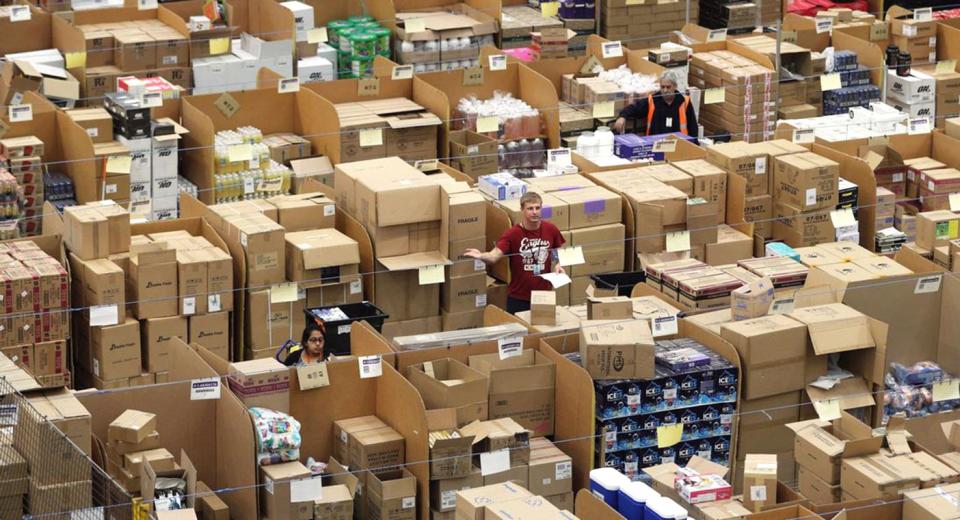Why shopping empire has been lured south to 'Golden Triangle'

The decision by Shop Direct to close three fulfilment centres in Greater Manchester, with the loss of almost 2,000 jobs, is a sign of the times.
It is also another case of the Midlands winning out, in terms of jobs, at the expense of the other parts of the country.
In online retailing, in which Shop Direct is the UK's second largest player, location of your fulfilment centres is everything.
Increasingly, that involves close proximity not only to the UK's biggest motorways and mainline rail routes, but also airports - and puts the Midlands at a clear advantage because, by definition, it is in the heart of the country.
The growing popularity of opening fulfilment centres in the Midlands is something anyone who has driven up the M1 or M6 or taken a rail journey on the East Coast Mainline will recognise.
Indeed, those working in the UK logistics and commercial property industries have long talked of the 'Golden Triangle'.
There's no official definition as to what constitutes the triangle.
Some say it connects Northampton, Leicester and Coventry. A broader definition has it extending from Bedford to the south, Nottingham to the north and Kidderminster to the west.
However, it can definitely be said the triangle takes in Birmingham, Coventry, Leicester, Rugby, Nuneaton and Northampton or, in county terms, all of Northamptonshire, Leicestershire, Warwickshire and big chunks of Staffordshire and Derbyshire.
:: 2,000 jobs at risk as Shop Direct closes three sites
All of the major players in UK e-commerce and retail are there.
Amazon, for example, has three huge fulfilment centres at Rugeley in Staffordshire, Coalville in Leicestershire and Daventry in Northamptonshire.
When online grocery retailer Ocado became a nationwide service, five years ago, it opened its fulfilment centre at Dordon in north Warwickshire- a move that enabled it to subsequently offer Morrisons, whose market share is traditionally stronger in northern England, an online partnership.
Tesco (Frankfurt: 852647 - news) and Asda also have huge presences in the triangle.
So too do all the big third-party distributors like DHL, Eddie Stobart and Norbert Dentressangle.Property companies were quick to spot the attraction.
There is an estimated 150 million square feet of warehouse space in the Midlands - more than in Greater London, Scotland and Wales combined.
So the decision of Shop Direct to relocate to the East Midlands, while devastating for those who will lose their jobs, makes sense.
The company is looking ahead to a time in which customers increasingly want 'same day' delivery of the goods that they have bought.
That requires more investment in the automated systems that will increasingly bear the load of collecting, packaging and sending out goods across the country.
It also requires the most appropriate location, which is why Shop Direct has opted for the East Midlands Gateway, a massive logistics park being built by the FTSE-100 property group Segro (Frankfurt: S4VC.F - news) on 700 acres of farmland next to East Midlands Airport - the UK's second largest cargo airport - and Junction 24 of the M1.
It will have 6 million square feet of warehousing space and its own rail freight terminal.
Those who have already agreed to take space at the site include Amazon and Nestle (Swiss: NESN.VX - news) while UPS also plans to open a new £100m air freight terminal adjacent to the airport.
The three sites Shop Direct is closing, at Shaw and Raven in Oldham and at Little Hulton in Worsley, are old Victorian mills built on several levels.
They are not equipped for the kind of systems Shop Direct, whose brands include Very, wish to install, even though, by some measures, the site at Shaw is one of Europe's largest distribution centres.
Neither their location nor their layout is appropriate for what is required in future.
Yet this is also a deeply symbolic moment in another way.
The sites closing include the remnants of the old Great Universal Stores home shopping empire founded in 1900 by Abraham, George and Jack Rose in Manchester and which was synonymous with the city for the next century.
For most of that time, GUS was the biggest name in UK home shopping, with travellers to Manchester Piccadilly railway station greeted for decades by a huge sign spelling out the company's name.
However, in 2003, the mail order business was sold to the rival Littlewoods empire, founded 34 miles down the East Lancs Road in Liverpool and by then owned by David and Frederick Barclay.
So these closures, when they come in 2020, will mark a cutting of ties with Greater Manchester - even though Shop Direct will continue to have two smaller offices in the city.
For most of the century in which it dominated home shopping, GUS - or 'Glorious Gussies', as it was known to most working the floor of the old London Stock Exchange (Other OTC: LDNXF - news) - was led by a generation of retailers: Isaac Wolfson, his son Leonard and his nephew David.
The latter was also chairman of Next (Frankfurt: 779551 - news) , where the chief executive for the last 17 years has been his son, Simon.
Next relocated its head office to Leicester as long ago as 1986 in order to be closer to its garment manufacturers.
With (Other OTC: WWTH - news) the benefit of hindsight, it was blazing a trail to the East Midlands.

 Yahoo Finance
Yahoo Finance 